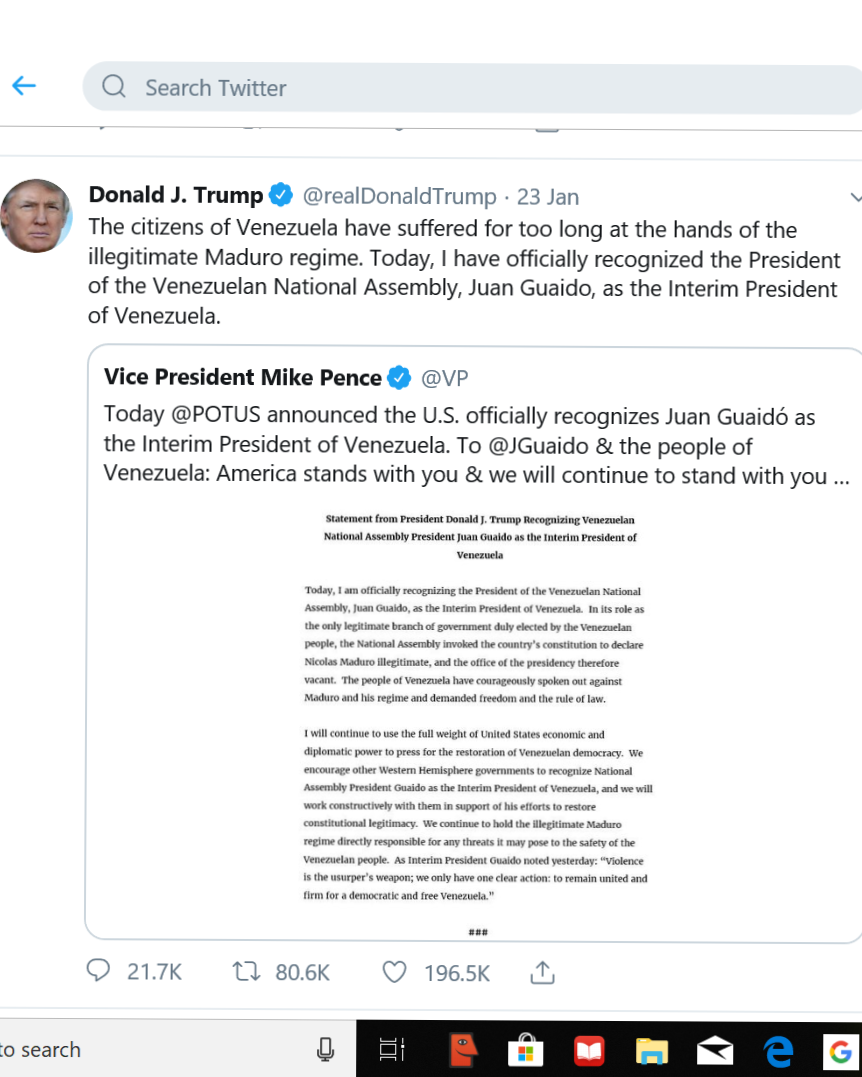By Meg Harding 2nd year German and Politics
Meg Harding debates the social, economic and political question of accepting aid from The United States and what this could mean when under a Trump administration.
Political turmoil in Venezuela has escalated even further since the beginning of 2019, with the country now being left in a dire stalemate. On 23rd February, tonnes of vital aid sent primarily from the United States was turned away at the border after being met by Venezuelan security forces and riot police, blocking the entrance of essential food provisions and medical supplies.
Background:
Venezuela has been in the midst of socioeconomic and political crisis for years, beginning during the presidency of Hugo Chávez and continuing under Nicolas Maduro, who took office following Chávez’s death in 2013. The crisis has been defined by rapid hyperinflation, food and medicine shortages, political discontent and soaring crime rates, resulting in mass emigration, with the UN stating that 2.7 million Venezuelans have fled the country since 2015.
The crisis came to a head earlier this year after Maduro was sworn in to a second 6-year term in office on 10th January. His election was declared illegitimate and undemocratic by many, including Juan Guadió, Leader of the Majority in the National Assembly, the legislative body of Venezuela, as Maduro’s main opponents were prohibited from running. On 23rd January, Guadió was declared as interim president by the National Assembly, citing the constitution of Venezuela, which states that if the presidency is left vacant, the head of the National Assembly should assume office. Over 50 countries have officially recognised Guadió as the rightful president of Venezuela, including the USA and many democratic Latin American states.
Maduro reacted by breaking off diplomatic relations with the US and claimed that ‘they intend to govern Venezuela from Washington’, claiming that with US intervention, Venezuela would have ‘a puppet government controlled by Washington.’
Russia has condemned international support for Guadió’s claim of presidency, criticising the intervention into Venezuelan domestic affairs and stating that support violates international law.

Twiiter / President Trump
Humanitarian aid:
In the midst of such a crisis, urgent humanitarian assistance is required on the ground in Venezuela. Guadió has said that 300,000 people may die without an influx of such aid, including medical supplies and food provisions such as rice, beans and high-energy biscuits.
USAID has been in communication with Guadió, organising the deliverance of humanitarian aid across the Brazilian and Colombian borders, working closely with their respective governments to enable this. Another base for the operation has been established in the Caribbean island of Curaçao, a constituent country of the Kingdom of the Netherlands.
Speaking on 16th February in Cúcata, the Colombian border town with Venezuela, Mark Green, the administrator of the US Agency for International Development, stated that the ‘humanitarian assistance is merely a treatment. The long-term problem is Maduro and his regime, that are crushing the people of Venezuela, their economy, and their hope.’ Green also directly addressed the Venezuelan security forces, pleading with them ‘to let this life-saving aid in immediately.’
However, on 23rd February, Maduro’s security forces blocked 178 metric tonnes of food and medical supplies from crossing into Venezuela. Tear gas and rubber bullets were fired at activists trying to deliver aid, as well as live ammunition which is believed to have come from colectivos, paramilitary groups loyal to Maduro’s regime. As a result, four people are reported to have died and around 300 have been left injured.
Venezuela has since closed its borders to Colombia and Brazil, as well as maritime borders with three Caribbean islands and broken off diplomatic relations with the respective countries.
Some aid managed to cross the southern border with Brazil, however it is now stockpiled at the Venezuelan customs checkpoint, so it is unclear if any aid will actually be able to reach the Venezuelan communities most at need.
Why has this aid been turned away?
Maduro has stated that he believes such aid is part of an ‘imperialist’ US plot, laying the foundations for a US-led invasion of Venezuela. Aid operations involving Guadió are also seen as a way of undermining Maduro’s presidency.
Russia is also critical of US intervention in Venezuelan domestic affairs, and has instead offered aid of its own. Foreign Minister Sergey Lavrov said that Russia would be increasing its deliverance of wheat and medical supplies, following a previous shipment of 7.5 tonnes.
In response to the blocking of aid, the US has imposed further sanctions upon members of the Venezuelan security forces. This follows US sanctions placed upon Venezuelan oil on 28th January, which have resulted in a 40% drop in oil exports in just one month. As oil exports are the largest contributor to Venezuela’s GDP, this only worsens the situation for the Venezuelan people. Such sanctions are designed to force Maduro out of office and to encourage defections from the armed forces in the hope that weakened military strength will topple the regime.
What now?
Venezuela appears to be in a sort of stalemate. The Venezuelan population is in dire need of aid, wherever that comes from. Guadió has stated that he remains committed to providing humanitarian aid, and will find another way for this to happen, however the logistics of this remain unclear at present. Venezuela desperately needs some political stability, yet this does not seem at all imminent.
Featured Image: Flickr/ Eduardo Sánchez
Do you think Venezuela should accept aid? Let us know!









